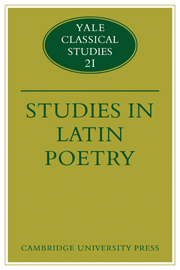Book contents
- Frontmatter
- Contents
- The Saturnian Verse
- The Menaechmi: Roman Comedy of Errors
- Imperator histricus
- Nine Epigrams from Pompeii (CIL 4.4966–73)
- Obscura de re lucida carmina: Science and Poetry in De Rerum Natura
- Catullus 64 and the Heroic Age
- Bacchus and the Horatian Recusatio
- Two Horatian Proems: Carm. 1.26 and 1.32
- Ovid and the Law
Nine Epigrams from Pompeii (CIL 4.4966–73)
Published online by Cambridge University Press: 10 January 2011
- Frontmatter
- Contents
- The Saturnian Verse
- The Menaechmi: Roman Comedy of Errors
- Imperator histricus
- Nine Epigrams from Pompeii (CIL 4.4966–73)
- Obscura de re lucida carmina: Science and Poetry in De Rerum Natura
- Catullus 64 and the Heroic Age
- Bacchus and the Horatian Recusatio
- Two Horatian Proems: Carm. 1.26 and 1.32
- Ovid and the Law
Summary
In 1883 our knowledge of one genre of Latin poetry was roughly doubled: fragments of nine epigrams, three of which were substantially complete, were found scratched on the outside wall at the west entrance gate of the Small Theatre in Pompeii and were recognized almost immediately as examples of pre-neoteric, amateur verse inspired by Hellenistic epigram, a genre represented until then only by the five epigrams of Aedituus, Licinus, and Catulus (Morel, FPL, pp. 42–3, 46). A faint note of enthusiasm can be detected in the words of those who read and studied the graffiti at the time, but since then the epigrams have again been almost universally forgotten, not only by Lovers of Poetry (whose lack of enthusiasm may be freely pardoned), but even by historians of Latin literature seeking to reconstruct this important, though dark, area of poetic development. It would seem worthwhile, then, to sketch a history of the epigrams since their discovery, to present the text in a purer form than that which can easily be had today, and to discuss briefly the importance of these fragments and their place in the development of Latin poetry.
- Type
- Chapter
- Information
- Studies in Latin Poetry , pp. 125 - 142Publisher: Cambridge University PressPrint publication year: 1969
- 47
- Cited by



